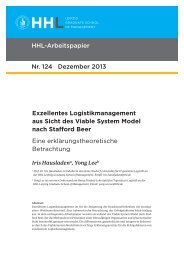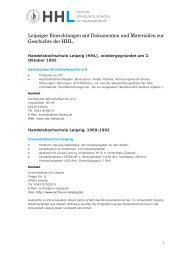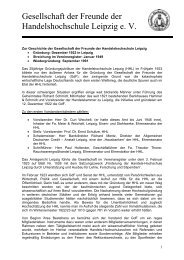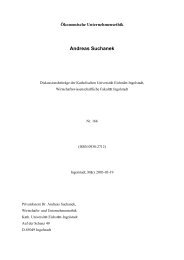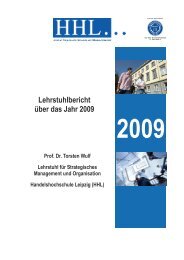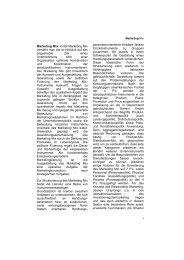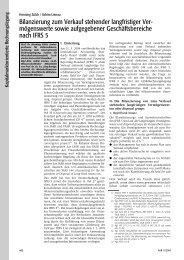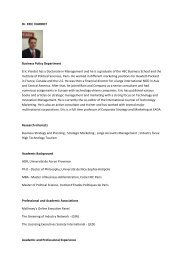Students - HHL Leipzig Graduate School of Management
Students - HHL Leipzig Graduate School of Management
Students - HHL Leipzig Graduate School of Management
Create successful ePaper yourself
Turn your PDF publications into a flip-book with our unique Google optimized e-Paper software.
32 Research & Programs<br />
Sparkassen-Finanzgruppe Chair <strong>of</strong> Macroeconomics<br />
Outstanding <strong>HHL</strong> Diploma thesis about “Monetary policy <strong>of</strong><br />
the Fed and the ECB during the financial crisis”<br />
The Federal Reserve and the European Central<br />
Bank reacted to the financial crisis with an unprecedented<br />
“policy <strong>of</strong> easy money” and several<br />
unconventional measures. More and more people<br />
are concerned that inflation might as a result<br />
rise to unprecedentedly high levels once economic<br />
growth accelerates again. In his Diploma<br />
thesis, Phillip Rädle (K23) compares the measures<br />
taken by both central banks during the<br />
crisis and analyzed the consequences for their<br />
<strong>HHL</strong> news talks with Pr<strong>of</strong>essor Dr. Wilhelm<br />
Althammer about “economic reasoning.”<br />
<strong>HHL</strong> news: The main goal <strong>of</strong> your courses<br />
at <strong>HHL</strong> is to promote the development <strong>of</strong><br />
rigorous economic reasoning. What exactly<br />
is the meaning <strong>of</strong> this term and why should<br />
today‘s manager know about it?<br />
Pr<strong>of</strong>essor Dr. Wilhelm Althammer:<br />
Economic reasoning involves the scientific<br />
method <strong>of</strong> economics, which uses abstract<br />
(and <strong>of</strong>ten simple) models to understand and<br />
explain how a complex real world operates.<br />
This modeling approach forces you to<br />
structure your thinking and to disclose your<br />
assumptions. <strong>Students</strong> are sometimes<br />
confused by the variety <strong>of</strong> models they can<br />
choose from, and the art <strong>of</strong> economic<br />
modeling is to decide which assumptions to<br />
make and on which aspect <strong>of</strong> the problem<br />
to focus. This method has an advantage: in<br />
discussions about economic policy, problem<br />
solutions are sometimes presented as if they<br />
balance sheets. He concludes that differences in<br />
the measures taken can be attributed predominantly<br />
to different monetary instruments – the<br />
monetary instruments <strong>of</strong> the Fed may in part be<br />
“outdated.” The Fed’s balance sheet worsened<br />
with its immense buying <strong>of</strong> illiquid assets. Exiting<br />
the policy <strong>of</strong> monetary easing may be much<br />
more difficult for the Fed than for the ECB. Consequently,<br />
inflation risks in the U.S. may be higher<br />
than in the Euro area if the exit is not success-<br />
Interview What changing incentives changes<br />
were the one and only solution – the<br />
model-based approach shows that there are<br />
always certain assumptions which drive<br />
results, and these should be disclosed.<br />
<strong>HHL</strong> news: Could you please give a<br />
current example?<br />
Pr<strong>of</strong>essor Dr. Wilhelm Althammer: There is<br />
a fine example from my lecture in tax policy.<br />
If you follow the discussion on tax reforms<br />
and tax reductions, the hope is <strong>of</strong>ten<br />
expressed that lower taxes might have a<br />
positive effect on tax revenues by changing<br />
incentives, the so-called Laffer Effect. Of<br />
course, this hope allows painful cuts in<br />
expenditure to be avoided or the announcement<br />
<strong>of</strong> an increase in public debt to be<br />
averted. In a model analysis, the critical<br />
elasticities can be identified, and comparing<br />
these elasticities with empirical estimates<br />
shows that a Laffer Effect will only happen at<br />
marginal tax rates that are far beyond the<br />
actual tax rates. Therefore, any decrease in<br />
tax rates will unambiguously decrease tax<br />
revenues.<br />
<strong>HHL</strong> news: What are the main challenges<br />
<strong>of</strong> today’s international financial system?<br />
Pr<strong>of</strong>essor Dr. Wilhelm Althammer:<br />
The governments <strong>of</strong> the major industrial<br />
countries have avoided a meltdown <strong>of</strong> the<br />
financial system by intervening massively in<br />
financial markets and by flooding the<br />
markets with liquidity. I see two main<br />
challenges for monetary policy and for<br />
<strong>HHL</strong> News – wiNter 2009/2010<br />
ful. Whether the exit is successful or not will<br />
largely depend on the effectiveness <strong>of</strong> the available<br />
instruments to reduce or at least control the<br />
enormous growth in the liquidity <strong>of</strong> commercial<br />
banks. The exceptional Diploma thesis by Phillip<br />
Rädle shows a thorough analysis <strong>of</strong> the balance<br />
sheets and a very strong link with the current<br />
economic situation.<br />
Oliver Hoßfeld<br />
financial market regulation. Monetary policy<br />
needs to find an exit option out <strong>of</strong> the<br />
excess in liquidity, and to find it early enough<br />
to avoid inflationary pressure yet late enough<br />
not to disrupt the recovery <strong>of</strong> the economy.<br />
In the field <strong>of</strong> financial market regulation, a<br />
new international architecture has to be<br />
found to handle the problem <strong>of</strong> systemic<br />
risks in order to avoid the bankruptcy <strong>of</strong><br />
large banks and countries. In this field, I see<br />
only minimal progress, and I have the feeling<br />
that the political discussion isn’t focusing on<br />
the right problems. It is not so much the<br />
compensation <strong>of</strong> bank managers that has<br />
caused the problems, it’s regulations that<br />
neglected the fact that markets do not work<br />
properly with asymmetric information, a<br />
situation typical for financial markets.<br />
<strong>HHL</strong> news: <strong>Students</strong> in your courses have<br />
to solve a couple <strong>of</strong> quizzes. What are<br />
they about?<br />
Pr<strong>of</strong>essor Dr. Wilhelm Althammer:<br />
The quizzes are just the application <strong>of</strong> a<br />
basic law <strong>of</strong> economic reasoning, namely<br />
that people respond to incentives. Previously,<br />
students started to learn the material in<br />
my courses shortly before the exam, and<br />
this was an inferior strategy. I introduced<br />
quizzes containing simple multiple choice<br />
questions on the topics <strong>of</strong> the last lecture to<br />
give them incentives to work more continuously.<br />
And it works: Even students in<br />
courses where I did not intend to use<br />
quizzes now ask for them.




